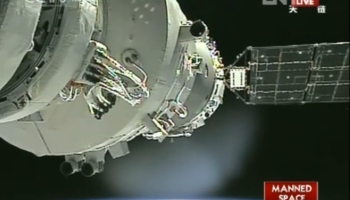Snail-like progress By Cai Meng
New company set up to develop space economy
The commercialization of rocket launches will boost the industry by bringing space tourism income and attracting private investment, experts said.
ChinaRocket Co. Ltd, a subsidiary of China Academy of Launch Vehicle Technology, the country's largest developer of ballistic missiles and carrier rockets, was established on Wednesday, marking the commercialization of China's space industry, the Xinhua News Agency reported.
"Chinese commercial space enterprises are lagging behind the global market due to lack of complete production chain in the commercial space industry and experience in commercial space activities like space tourism," Li Hong, president of the academy, said at a press conference on Wednesday.
"Commercializing rocket launches will help develop the industry as many private companies will be interested in the sector," Jiao Weixin, a professor at the School of Earth and Space Science of Peking University, told the Global Times on Thursday.
Jiao said the establishment of the company signals that State-controlled space industry is stepping into ordinary people's daily life.
Han Qingping, president of ChinaRocket, said at the press conference that the company would focus on keeping the cost 30 percent lower than an average launch through the "standardization of the interface between satellite and rocket as well as advance preparation."
According to Han, China will develop reusable sub-orbital vehicles in five to 10 years.
Han said the company will launch individual space travel services like "space taxi, free space ride and space shuttle bus" to promote the space economy.
According to Xinhua, ChinaRocket's individual space travel package would cost about $200,000.
Huang Jun, a professor at the School of Aeronautic Science and Engineering at Beihang University, said that "many countries have been studying the reusability of carrier devices and aircraft, but it will take at least one to two decades before visitors can afford a space trip."
The market value of commercial space in China would reach 30 billion yuan ($4.6 billion) annually by 2020, Xinhua reported, citing Hu Shengyun, a senior rocket engineer at China Aerospace Science and Industry Corp.
By Leng Shumei Global Times
China's atomic clock: The most accurate clock in the world
 China's atomic clock: The most accurate clock in the world
China's atomic clock: The most accurate clock in the world
https://youtu.be/zr-yLWLR6UE
China's cold atomic clock is the most precise time-keeping device ever built. The clock only weighs a couple kilograms and could fit comfortably in the boot of a car. And because it is powered by atoms, it won't have to be reset for another 30 million years.
Cold atomic clocks are the most accurate clocks in the world. Low-frequency lasers lower their internal temperatures to 273 degrees centigrade below zero, and slow down the movement of atoms inside. Slow-moving atoms decrease the likelihood of counting errors, and result in a more accurate counting of time.
"The frequency of the atom will not change. It is the same wherever it is. Unlike in mechanical clocks and electric clocks, atomic clocks aren't drastically affected by their surrounding environment. We are going to operate the most accurate cold atomic clock in space. It is the first time ever, not only for our country, but also for the world," Liu Liang, chief designer of Shanghai Institute of Optics and Fine Mechanics, Chinese Academy of Sciences, said.
Rubidium atoms count time inside China's cold atomic clock. Atoms are usually affected by gravity, but the low level of gravity in space will weaken the earth's gravitational pull and increase the accuracy of China's cold atomic clock.
"Atoms usually fall because of gravity, making it difficult to keep track of time for a long time. But up in space, we don't have that problem," Liu said.
The launch of Tiangong-2 marks China's transition from a follower in space research, to a pioneer. China's cold atomic clock project is a good example of that transition.
"The initial plan was brought up in 2006. We have made great efforts over the past ten years. We have been through a lot... and we have been successful" Liu said.
It took years of scientific work to get China's cold atomic clock into space. Researchers are now devising ways how to use the clock to benefit people down on earth.
Related posts:
Rendez-vous By Wang Xiaoying https://youtu.be/35B4d_3qCd0 Shenzhou-11 docks with Tiangong-2 space station ...

Graphics shows the launching process of Shenzhou-11 manned spacecraft.(Xinhua/Lu Zhe) https://youtu.be/7Jhx4J2j_kw China launches...







